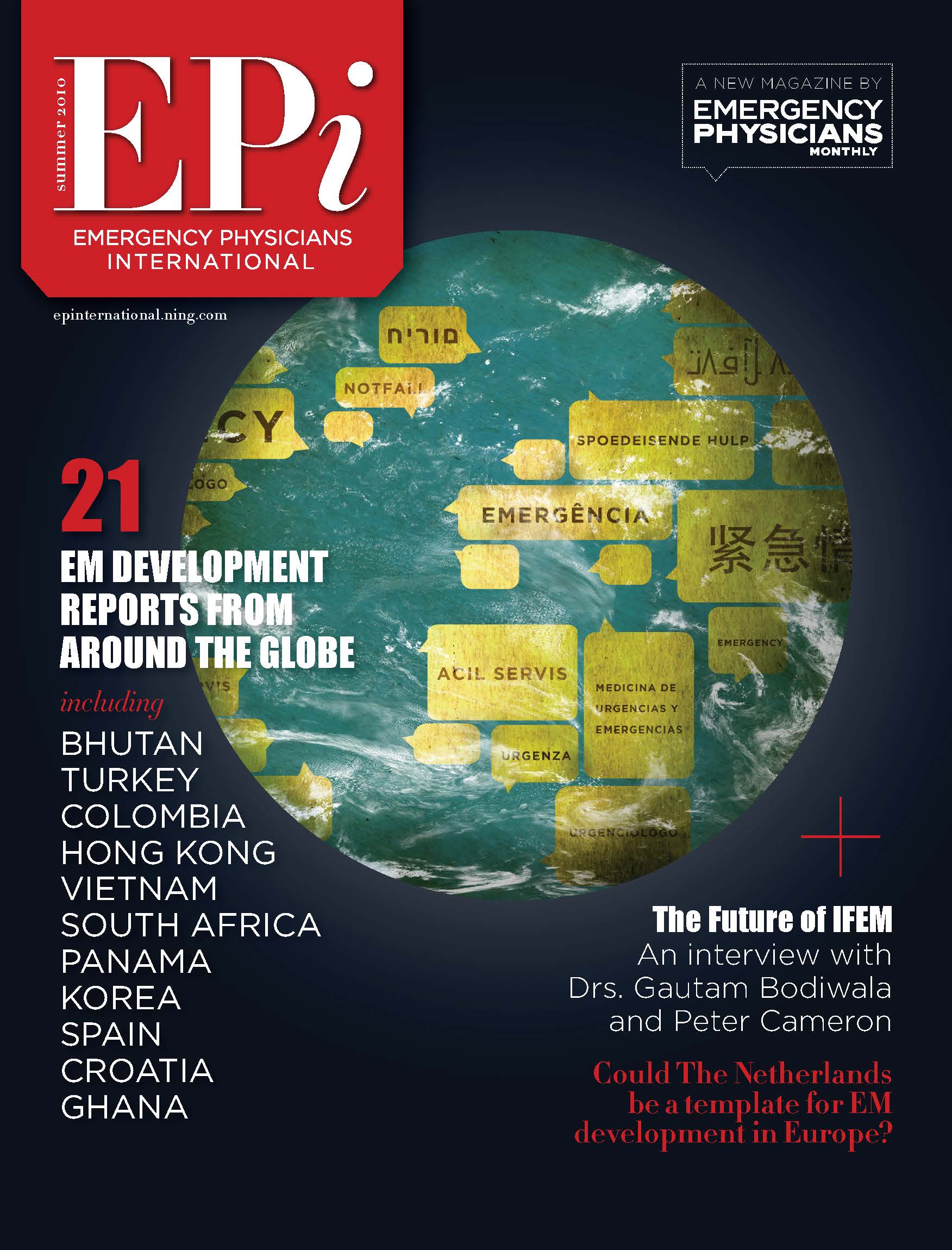The State of Indian Emergency Medicine: A Conversation with Dr. Tamorish Kole
Dr. Tamorish Kole is a long-time leader in emergency medicine, active at the national, regional and global levels. He’s the immediate past president of the Asian Society of Emergency Medicine and has served on various committees at the International Federation for Emergency Medicine (IFEM). In addition to work in emergency departments across India Dr. Kole founded a company called Emergency Zen that addresses India’s emergency medicine workforce challenges. We sat down with Dr. Kole to learn more about the greatest challenges and opportunities he sees in emergency medicine, both in India and around the globe.
EPI: For starters, tell us a bit about Emergency Zen, the company that you started during the first year of the COVID-19 pandemic?
Dr. Tamorish Kole: Emergency Zen is a training and skill development company that runs in multiple locations around India. We focus on “upskilling” doctors who are not formally trained in emergency medicine. In India 60-65% of the people who are working in the emergency department are not residency trained. That’s a chicken and egg situation. We train the people who are already doing the job today to do it at a higher level. Gradually we hope that the physicians in India will be residency-trained, but that will take some time. This is what we can do now.
EPI: How is the company growing and progressing?
Dr. Kole: We are currently doing physician training in five hospitals in India. We have started doing short courses. We are currently in the process of launching the first online program for upskilling emergency care workers while they’re at work. This is competency enhancement.
EPI: What is the current gap in India between the need for residency-trained emergency physicians and the ability for residencies to produce physicians?
Dr. Kole: India needs about 80,000 residency-trained emergency physicians. Currently the people who are trained or getting trained will not cross 10,000. So the gap is 8x.
EPI: What level of coverage would 80,000 trained emergency physicians get India to?
Dr. Kole: I’m just talking about a basic level of coverage, having trained emergency physicians in every hospital. This is just the baseline.
EPI: Some people in global emergency medicine feel that instead of using courses like this to upskill physicians we should triple down on residency training and insist on the gold standard. Do you see your courses as a path forward for other nations, or just what’s necessary to fill a critical gap in India?
Dr. Kole: When you look at how huge India is, and how big the gap is between the number of physicians we need and our ability to formally train them, I think this is the right model. It would take years and years to develop residency-trained physicians. Plus, there’s a tension because we don’t know how many people will take up emergency medicine as a specialty in the future. There’s burnout, violence against doctors, pandemics. So I strongly feel that we need to use technology to enhance the competency of the existing people working in emergency care.
In India there is very little attention paid to emergency nursing, so we’re also looking into programs we can develop for this population. There is a global nursing shortage, so some of our best emergency nurses are going abroad to find jobs. So there is a need for holistic development in order to prepare for future crises.
EPI: Outside of the workforce crisis you’ve just described, what do you see as the greatest challenges facing emergency medicine in India?
Dr. Kole: The biggest challenge is a result of COVID-19. The pandemic pushed emergency medicine to the limit, and all of the isolation and safety protocols were an incredible burden on the specialty. Regional health systems need to be ready to face future pandemics because COVID is not the last one. There will be many more to come.
The second challenge is how to sustain emergency medicine. We have reached a breaking point. Everyone wants to come to the emergency department. More and more services are being provided by emergency physicians. That puts incredible pressure on emergency medicine. So not only is there a pandemic, but more people are coming to the emergency department for other problems, creating resource problems and even longer wait times.
If India’s emergency medicine systems were more mature, these stresses might be manageable. But Indian EM is like a young sapling that’s under threat. Some other systems needs to protect emergency medicine and emergency physicians or there are going to be problems. My theory is that if we don’t, not enough doctors will pursue this specialty in the future.
EPI: What are your observations of the next generation of emergency physicians?
Dr. Kole: I’ll tell you a story. I was mentoring a young doctor who had just entered emergency medicine. He’d joined the national residency program. He asked me if he could switch from emergency medicine to cardiology. I said, “Why would you need to switch to cardiology? You’re an emergency physician.” Somewhere along the line in our EM education it isn’t sinking in that emergency medicine isn’t just a specialty, it’s a mindset and a lifestyle. It means being satisfied with less. It means uncertain diagnosis, unwanted challenges. We have a responsibility to drill that mindset into the next generation. Emergency medicine is not a stepping stone to another sub-specialty.
It hasn’t helped that compensation has gone down for most emergency physicians in India. Which is a problem since we need to train more emergency physicians, not less. I’ve very much worried about this, and I hope it won’t continue. There shouldn’t be cost cutting; there should be support.
EPI: Recognizing that we need systemic change at every level, from physician mindsets all the way up to governments, where do you think there’s opportunity for the greatest improvement in emergency medicine?
Dr. Kole: I think it has to happen at the hospital administration level. That’s the micro-ecosystem for emergency medicine. At the macro governmental level, they can work on big changes, but it’s slow. The fast way to change is to work with micro-systems at the hospital level. Hospital CEOs and others in leadership need to support emergency medicine. The patients also play a role in giving feedback and helping the hospital appreciate the value of emergency medicine.
EPI: What specific ways can hospital administrators support emergency medicine? Are we just talking about bigger budgets?
Dr. Kole: It’s not just bigger budgets. It’s that support system. The governance and leadership of the hospital needs to understand the value of emergency medicine and the support it needs. Do they have adequate involvement? Are they looking into the wellbeing of physicians and nurses? All of these things matter just as much as budget.
Hospital administrators also need to make sure that technology is being leveraged appropriately for the benefit of patients and providers. The practice of medicine is going to change in coming years. It’s not just about seeing patients and doing tests and making a diagnosis. We need to employ a lot of technology. Patients can be seen outside the hospital using telemedicine. There are opportunities for tele-triage and remote patient monitoring. There’s also triage using artificial intelligence.
EPI: How can emergency physicians get more involved in innovation given that they’re so overburdened?
Dr. Kole: We need to inspire young emergency physicians to get more involved in entrepreneurship. In India, two of our colleagues are working on healthcare startups. We are finding people who want to do it. A lot of physicians are also pursuing their management studies (MBA) in order to understand the healthcare system and speak to leadership in a knowledgeable way. There is a change that is happening.
EPI: We’ve talked about a number of challenges. What gets you excited about the future of emergency medicine?
Dr. Kole: Globally we’re seeing a realization that emergency care is essential. That’s the best thing that can happen to the specialty at the macro level. There are many national governments that are trying to put emergency care at the forefront of their priority list. Even in India we’re seeing this growing understanding. I read with great optimism a study published in India about the lack of emergency care in the country. I was optimistic because understanding a problem is the first step to fixing it. What you can’t measure you can’t fix. We’re finally measuring the right things in Indian emergency medicine, and that’s a step in the right direction.






